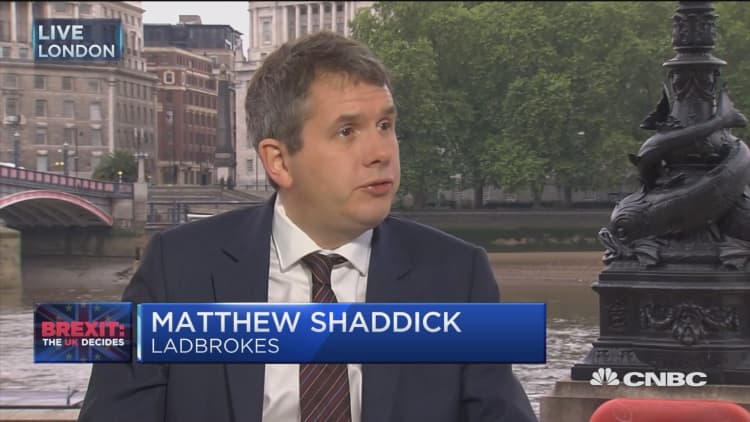
While polling data suggest it is still a tight race between the leave and remain campaigns in the U.K. referendum, bookies are predicting a vote to remain is much more likely.
"At the moment, the odds are suggesting there is a 76 percent chance the U.K. will vote to stay in the European Union. That's despite the polls still showing this is more or less a dead heat," Matthew Shaddick, head of political betting at Ladbrokes, told CNBC.
Shaddick explained that the odds are based on how much money the bookmaker receives: the more money it receives for a vote to remain, the lower the odds.
"What's really motivating investors is the general tendency in events like this for the status quo to do a bit better on polling day," he added.
Although Ladbrokes has received a higher volume of bets to leave the EU, those making a punt on remain were placing higher financially larger. Shaddick revealed the average stake on a bet to remain was £450, compared to £75 on a bet to leave.
Shaddick estimated that around £100 million ($146 million) had been bet on the result and said the referendum might be the biggest political betting event of all time.
And as bookmakers strongly expect remain to win the referendum, focus has turned to how large the margin of victory will be.
"On the eve of the referendum the odds are still firmly implying a 76 percent chance of a vote to remain," Naomi Totten, spokesperson for bookmaker Betfair, said in a press release. "Attention is now being drawn to the margin of victory for remain, with between 50.01 percent and 55 percent the favourite on the vote percentage market."
The value of bookies' predictions compared to polling data has been a bone of contention during the referendum campaign. Most academics prefer public opinion surveys.
"Public opinion polls are the best-known method to predict election results," Professor Rainer Schnell, director of the centre for comparative social surveys at City University London, told CNBC via email.
"All other approaches, such as big data collected on social media networks like Twitter, but also betmakers' forecasts, may be less reliable," he added. "Public opinion polls, by contrast, produce relatively reliable predictions, if they are based on true random probability samples – for example, telephone or face-to-face interviews."
However, Shaddick defended the track record of bookmakers' predictions.
"On polling day of the [U.K.] general election last year, the polls were saying it was going to be a dead heat between Labour and the Conservatives, but betting markets were saying there was an 80 percent chance the Tories were going to be the biggest party, which of course ended up being the case," he said.
"Although, we didn't catch the size of their majority. Very few people did."
One problem with predicting the result of the EU referendum is that, unlike general elections, there is little historical data to use or any votes to compare against.
"We don't have a lot of big referenda in the U.K.," Shaddick explained. "The nearest comparison would be the Scottish Independence referendum a couple of years ago. Both the polls and betting markets got that right. I think the one big unknown here is what the turnout is going to be."
At the time of writing, the Financial Times' polls of polls (which tracks the results of the most recent polling data) said 44 percent of the public backed a vote to remain, while 45 percent backed a vote to leave. The referendum will be held on June 23.


